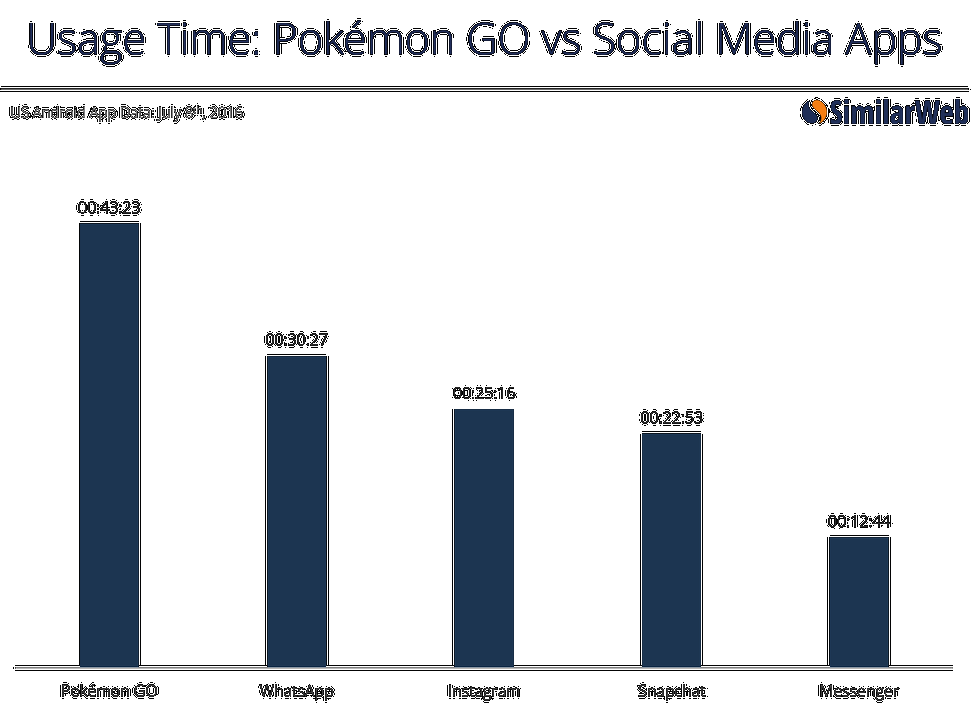Over the past week, it has been impossible to avoid the instantaneous popularity of Pokémon Go. What once started as an April Fool’s joke is now the most popular app in the App Store. Pokémon Go is an ‘augmented reality’ game where users search for Pokémon (on their mobile phones) in real life. Using the GPS feature on your phone, Pokémon are now scattered throughout your neighborhood, waiting to be collected.
When Pokémon Go was first released, it instantly blew up on social media. After the launch of Nintendo’s new app, social platforms such as Twitter, Instagram, Snapchat and Facebook are watching their backs because new data shows Pokémon Go is rapidly taking over.
This report from Business Insider shows that Pokémon Go’s daily active user ratings are climbing up to Twitter, which boasts 310 Million monthly active users. Even though it is speculated the Pokémon Go surpassed Twitter in daily active users, there is no updated report.
Pokémon Go is also beating other social platforms on usage time. It was released just last week and reached number 1 in US iPhone sales in 13 hours. The millions of downloads added $9 billion of market value to Nintendo and raised the company’s stock price by 23%. Sounds like Nintendo is having a good week.
The success of the app is mainly because of user experience and unseen competition. Users’ emotions and instant gratification always support an app’s popularity. For example, when the Wii gaming console came out in 2006, it was released at the same time as the Playstation 3 and Xbox 360. But why was the Wii so popular? Because it was a fun and social experience! Playing Mario Kart and Wii Sports with your friends was more fun than sitting in your room alone and playing PS3. The point is, emotion will always win out on technology.
Secondly, the social platform competition, which no one saw coming. How could a 20-year-old franchise turned mobile card-trading game possibly blow Instagram, Snapchat and Twitter out of the water? Many suggest the strong brand foundation. Rooted in our 90’s childhoods, we are constantly longing for the days when we lovingly flipped through binders full of Pokémon cards: nostalgia always wins.
The app has made new strides in technology because Pokémon Go instantly changes everything for gamers. Before, on any given rainy day, you could find hundreds of teenage boys all sitting inside with the blinds shut playing video games. With Pokémon Go, the app forces you to go outside in order to play. Parents no longer have to take away iPhones for their children to play outside because now kids can play outside with their iPhones!
I hope I’m not the only one who was shocked and a little bit scared to see my neighborhood swarming with packs of thirteen-year-olds, noses buried in their iPhone screens. What was once a scene from a dystopian movie is now becoming a reality.
With users roaming on city streets all over the globe, it has created safety hazards, caused armed robberies, and even the discovery of a dead body. Turns out it’s not all fun and games when you’re catching ‘em all.
However, Pokémon Go has created a community of users who share a common interest. If you live in a big city, such as New York, you’ve seen hordes of people roaming around public places such as Central Park, which has become a chaotic hub for hopeful Pokémon trainers. All across Twitter, Reddit and Facebook, users are telling stories of bonding with other players who would otherwise be strangers.
Stories have been shared that it has even improved the mental health of players. The app has helped those that suffer from depression or mental illnesses by enabling them to go outside and walk around when they would normally stay at home. It has also boosted fitness, with users sharing screenshots of their step-counting apps, showing how Pokémon Go has helped them reach their fitness goals.
Not only that, but restaurants, retail stores and businesses are taking advantage of using ‘lure modules.’ Lures are a signifier to Pokémon Go players that the area is a hub for Pokémon. By purchasing lures, businesses have seen an immediate increase in customer traffic. The popular NYC bookstore, Stand Book Store, which discovered last week that it was registered as a Poké Stop, has seen an increase in customers finding players capturing Pokémon between the book shelves. And for those wanting to spice up their night out, there has been a Pokémon Go Bar Crawl scheduled for July 23 in Brooklyn.
But what does this all mean for the future of technology? It means that tech companies will start to think about the users, not their technology. Even though Pokémon Go has suffered major technical difficulties with servers crashing after its release, players keep coming back.
Tech companies (especially competitors) are wondering how long the successes of Pokémon Go will play out for Nintendo. So soon after its release, there’s no solid prediction. Proven from its extreme popularity, Pokémon Go is a success because of the Pokémon brand, unforeseen popularity and user interaction which has created a new platform and standard for emerging technology.
With this new focus, there’s no telling what the next innovation will be.


























